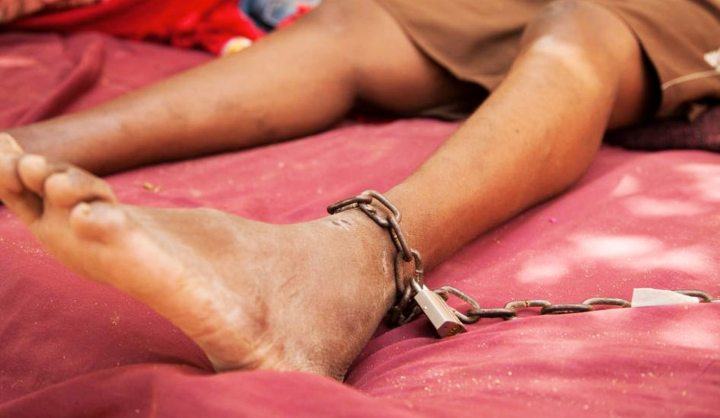Africa
Analysis: Somaliland’s mental health crisis

In an unusual new report, Human Rights Watch investigates what it’s like to be mentally ill in the self-declared Republic of Somaliland. Spoiler alert: it involves abuse, neglect and prolonged chaining. The implications of the report, however, go even further than this. Somaliland’s high levels of mental illness suggest a nation suffering from post-traumatic stress disorder – and if Somaliland, an oasis of calm and stability in the region, has it bad, then elsewhere must be even worse. By SIMON ALLISON.
Even in developed countries, with state-of-the-art drugs, care and facilities, dealing with mental illness is never easy. Imagine, then, how much harder it is to suffer from mental illness in countries without these comparative luxuries, in places where stigma still trumps science and healthcare is rudimentary at best.
Places like Somaliland, the self-declared republic that broke off from Somalia more than two decades ago, and continues to vociferously declare its independence even as the rest of the world ignores its claims. Unlike Somalia proper, Somaliland enjoys peace and stability, and boasts the most impressive democracy in the region (even if presidential elections have been delayed by two years). But it is still a desperately poor and underdeveloped country, with a weak and underfunded health system that struggles to provide basic care to the 3.5-million population.
A new Human Rights Watch report examines what it is like to suffer from mental illness in Somaliland, and its findings make for grim reading. “Men with perceived or actual psychosocial disabilities face abusive restraints, beatings, involuntary treatment, and overcrowding in private and public health centres. Most are held against their will and have no possibility of challenging their detention. In private centres in particular, those with psychosocial disabilities face punitive and prolonged chaining, confinement, seclusion, and severe restrictions on their movement,” said Human Rights Watch.
The research focused primarily on men, because it is mostly men who are allowed to go to these public or private mental health facilities. Women are far more likely to be kept at home, where conditions can be even worse, or sent to traditional healers.
Thirty-five-year-old Abdi is a typical case. His sister checked him into a private institution, where he spent 14 months shackled at the ankles, locked inside for almost the entire time with no way to challenge his confinement. He was given strong psychotropic drugs, with no explanation of what they did or why he needed them. If he refused to take the meds, he was beaten and slapped by the guards. “I was so happy to leave, I felt like a prisoner there, I felt like I was getting my freedom back when I left,” he said shortly after his discharge.
Cases like Abdi’s are tragic, especially because – in theory, at least – Abdi is one of the lucky ones. His family are progressive enough to realise that he has a mental condition that requires treatment, and wealthy enough to afford an expensive private centre for him.
In Somaliland, issues around mental illness are particularly relevant because there is so much of it around. Although the statistics are shaky, the little information that is known suggests that Somaliland has one of the highest rates of mental health problems in the world. And it’s not hard to see why, given Somaliland’s violent pre-independence history (the territory fought a bloody civil war against Somali dictator Siad Barre in the late 1980s and early 1990s).
“Most small studies that have happened in Somaliland, and our discussions with health professionals and people with disabilities, point to post-traumatic stress disorder, the trauma of the war. There are some interesting cases that suggest the most severe sufferers are veterans of the civil war,” Laetitia Bader, a Human Rights Watch researcher who worked on the report, told Daily Maverick.
“We don’t make the direct link between mental health and cycles of violence, but it’s just obvious. It’s incredible that with the amount of families we visited almost entire generations of men were entirely unable to function,” she said.
Bader said the mental health problems are compounded by the widespread use of khat, a narcotic plant. “There is a link between khat and mental health. It doesn’t appear to actually cause mental health problems, but it definitely serves as a trigger for underlying mental health problems. If it is used as self-medication by, say, people with depression, it could trigger psychosis,” she said.
Somaliland is an interesting place for this kind of study. Its stability, combined with its recent history of conflict and location in a volatile area, makes it a kind of window into conflict and post-conflict societies. While researchers simply can’t do this kind of work in Somalia proper, they can in Somaliland. And if things are this bad in Somaliland, then how much worse is the mental health in countries that are still at war with themselves – and have been for decades? DM
Read more:
- Somaliland: People with disabilities abused, neglected on Human Rights Watch
Photo: A resident sits with his foot chained in the courtyard of the Raywan private center in the Somaliland capital Hargeisa, on July 29, 2015. (© 2015 Zoe Flood for Human Rights Watch)

















 Become an Insider
Become an Insider